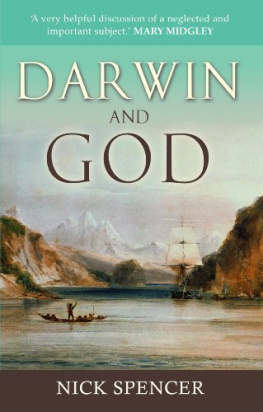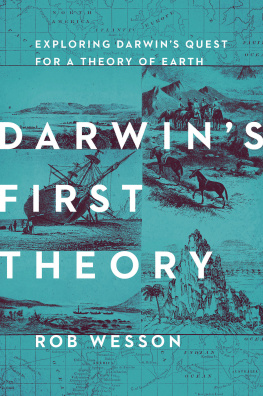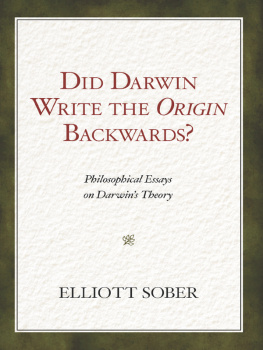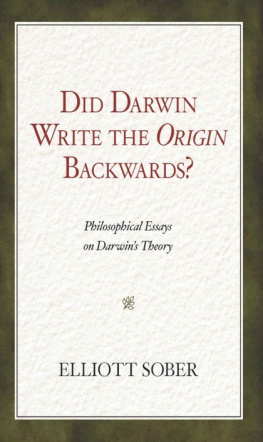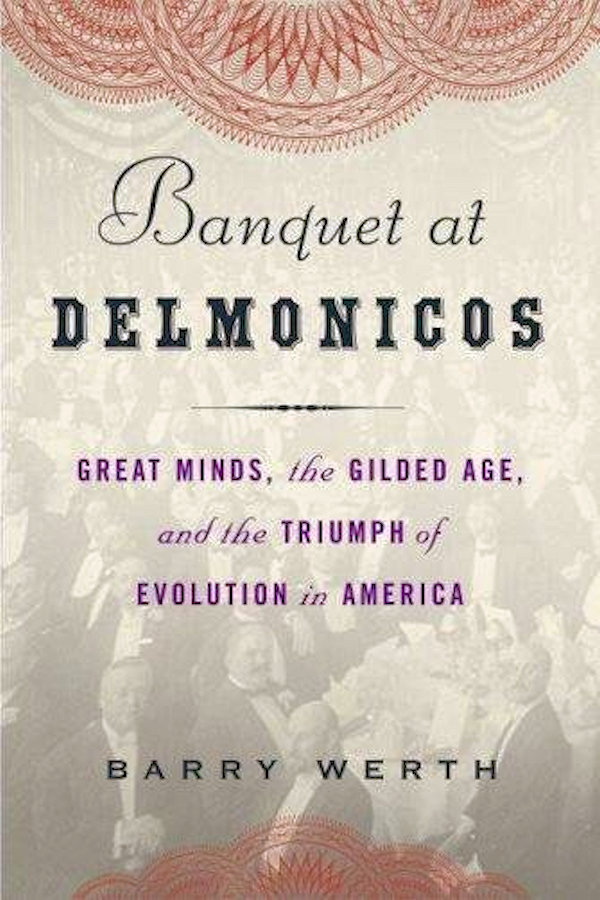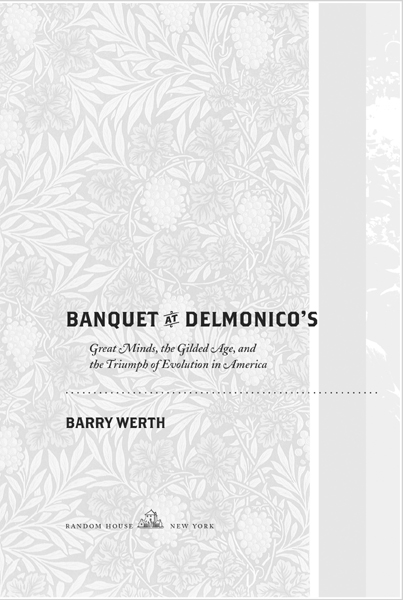ALSO BY BARRY WERTH
31 Days
The Scarlet Professor
Damages
The Billion-Dollar Molecule
The Architecture and Design of Man and Woman
(co-authored by Alexander Tsiaras)
From Conception to Birth
(co-authored by Alexander Tsiaras)
Copyright 2009 by Barry Werth
All rights reserved.
Published in the United States by Random House, an imprint of The Random House Publishing Group, a division of Random House, Inc., New York.
R ANDOM H OUSE and colophon are registered trademarks of Random House, Inc.
LIBRARY OF CONGRESS CATALOGING-IN-PUBLICATION DATA
Werth, Barry.
Banquet at Delmonicos: great minds, the Gilded Age, and the triumph of evolution in America / Barry Werth.
p. cm.
eISBN: 978-1-58836-798-3
1. Social DarwinismUnited StatesHistory19th century. 2. Human evolutionSocial aspectsUnited StatesHistory19th century. 3. Social changeUnited StatesHistory19th century. 4. Spencer, Herbert, 18201903Influence. 5. Dinners and diningNew York (State)New YorkHistory19th century. 6. Delmonicos Restaurant (New York, N.Y.)History19th century. 7. IntellectualsUnited StatesBiography. 8. United StatesIntellectual life19th century. 9. United StatesSocial conditions18651918. 10. United StatesSocial life and customs18651918. I. Title.
HM 631. W 47 2009
303.4097309034dc22 2008016567
www.atrandom.com
v3.1_r1
To Kathy
CONTENTS
PROLOGUE
NEW YORK, NOVEMBER 8, 1882
CHAPTER ONE
CAMBRIDGE, 1871
CHAPTER TWO
NEW HAVEN, 1872
CHAPTER THREE
NEW YORK, 1873
CHAPTER FOUR
NEW HAVEN, 1874
CHAPTER FIVE
BROOKLYN, 1875
CHAPTER SIX
WASHINGTON, 1876
CHAPTER SEVEN
BALTIMORE, 1877
CHAPTER EIGHT
BROOKLYN, 1878
CHAPTER NINE
FRENCH RIVIERA, 1879
CHAPTER TEN
WASHINGTON, 1880
CHAPTER ELEVEN
NEW YORK, 1881
CHAPTER TWELVE
NEW YORK, 1882
INTRODUCTION
T HE C IVIL W AR THRUST A MERICA into the modern world. When the first shots were fired in 1861, we were an unsettled country composed mostly of farm families and independent local industries and institutions, a young patchwork race, overwhelmingly Christian. We would kill 620,000 of our ownalmost two percent of the populationto preserve our idea of ourselves as a united, God-fearing, freedom-loving people. By the time it was done we were hurtling toward becoming a world power. Yet as Lincoln pointed out in his immortal first phrase commemorating the battle of Gettysburgwhere more than fifty thousand died in three days of fightingthe nation in the bloody summer of 1863 was just eighty-seven years old; old enough for its people to have conquered the continental lands and set up institutions to rule them, but on the cusp of another, even more colossal challenge: Now what?
What were we to become, and to think? After decades of struggling over slavery, a revolution in natural science, and an upheaval in the moral role of men and women in societythen the crisis of the terrible war itselfchurches and colleges were convulsed over the old truths about the hand of God in human affairs, and about the nature of reason and sin. New York had taken over as the power center of finance, information, and business, and the Republicans controlled the national government, including most urgently how to treat the vanquished South and West. Charles Darwins The Origin of Species, published two years before the war began, was read and obsessed over by scientists and theologians, but it was a biology book, and the country in its upheaval paid it only scant attention.
Traditional theology crumbled nearly to dust in the new postwar age. Many people craved an alternate system of beliefsnew principles to live and prosper by in the changing world, a creedbut Darwin, an English country gentleman, was a naturalist, not a philosopher. He had done more than anyone else to demonstrate the laws of change in nature, but during the war and for years afterward he publicly avoided the question of what evolution said about human behavior and society, and about right and wrong. It was Herbert Spencer, another Englishman and architect of the new system of science and reason, who first undertook that challenge. Spencera fearless and encyclopedic thinker and libertarian political theorist who privately was tortured, lonely, and consumed with his own frailtiesset out nearly a decade before the war to explain the universality of evolution not only in nature but in man, society, behavior, morals, history, and ideas; that is, in the entire living world.
In 1851, in his first major work of political philosophy, Spencer proposed what he called the Law of Equal Freedom: Every man is free to do that which he wills, provided he infringes not the equal freedom of any other man. This was the ethical stance from which all Spencers social prescriptions proceeded. Earlier liberals had recognized liberty as the key to life in society, but Spencer alone made equal freedom a general law of nature, the social equivalent of gravity. And in the years after the war, as the nation boomed and anything seemed possible to the rising classes, his philosophy uplifted those who used it to justify and explain everything from their own success in life, to why the North defeated the South, to why some races dominate others, to why the government shouldnt help the needy or interfere with trade; ultimately, to why America was destined to become the worlds preeminent society. Evolution elevated superiority to a natural imperative, a mark of fitness, and across the spectrum of ideas, thinkers looking both back through history and ahead to the future found Spencer irresistible.
His adherents extended wide power and influence. Carl Schurz, the countrys most powerful independent political figure, adapted Spencers Law of Equal Freedom to government; straddling the party divide, he helped thwart an early stab at imperialism, pressed the Republicans and President Grant to confront rampant corruption in their ranks, and reformed the management of the West, both of the land and of the Indians. The Brooklyn clergyman Henry Ward Beecher, storied equally for his progressive oratory and his scandalous personal life, used the most acclaimed pulpit in America to preach the gospel of evolution; that is, that it was Gods way to build better men and sort the worthy from the wretched. At Yale, Professor William Graham Sumner, a former minister, crusaded to bring economics and sociology under the Law of Equal Freedom by blending Christian virtue with the belief that unfettered competition is both natural and crucial for survival, while paleontologist Othniel Charles Marsh, discoverer of many of the great dinosaurs and of the first fossils to confirm evolutionary theory, transformed organized science by campaigning for and applying Darwins and Spencers ideas. Steel tycoon Andrew Carnegie exalted Spencer as a prophet of peace. Popular philosopher and historian John Fiske found in Spencers writing a basis for asserting that Gods destiny for America was to lead the world.
Most Americans still believed that sinners rotted in hell and tried to act accordingly, yet within a decade and a half after the war, Spencer influenced nearly every area of modern thought: science, ethics, sociology, anthropology, political theory, philosophy, psychology, metaphysics, economics, and religion. Darwin, who always hoped to see America, suffered from a range of chronic ailments that kept him from ever making the voyage. By the time Spencer, who expanded evolution into a far-reaching cosmology, visited the United States in 1882, he was hailed nearly as a conqueror. His three-month tour was a kind of victory lap for those mostly Republican men of science, religion, business, and governmenthis proselytizerswho in a few short decades had plugged Darwinism into the main circuitry of the industrial age. His visit climaxed in a grand farewell banquet at Manhattans finest and most venerable restaurant, Delmonicos.




